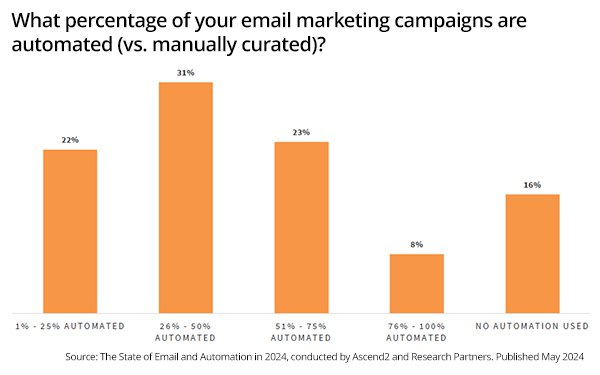
Automation is now imperative for email marketers. And most are
pretty effective at it, judging by The State Of Email And Automation, a study by Ascend2.
Of email marketers polled, 29% rate themselves as very successful, or best in class. And 63% are
somewhat effective. Only 8% are unsuccessful.
And most are moving ahead: 58% plan to include automation in their email program in the year ahead, up from 48% in 2023.
That’s not all they’re doing. The other big jump is in use of privacy/security features — 42% plan to deploy them, versus 30% last year. In addition, 37% are embracing
accessible design, compared to 30% in 2023, while 42% will utilize AI, up from 39%.
But there are varying degrees of implementation. Only 8% are between 76% and 100% automated, and 16% are not
automated at all. But 23% are 51%-75% automated.
advertisement
advertisement
Moreover, 31% of email marketers polled are 26%-50% automated, and 22% from 1% to 25%.
As with everything, there are
challenges. Marketers cite:
- Ensuring deliverability and avoiding spam filters — 48%
- Creating engaging content for automation —
45%
- Maintaining subscriber engagement over time — 45%
- Balancing automation with the authenticity of messages
— 41%
- Data integration and segmentation — 30%
- Managing unsubscribe rates and list hygiene —
25%
How do marketers measure the effectiveness of email campaigns?
- Revenue generated —
45%
- Return on investment (ROI) — 43%
- Engagement metrics — 38%
- Conversion rates
— 34%
- Click-through rates — 34%
- Customer Lifetime value (CLV) — 22%
- Deliverability rates — 20%
- Open rates — 28%
- Other — 3%
Meanwhile, AI use is growing.
Those using it have implemented it for:
- Re-engagement campaigns — 57%
- Event-triggered emails (i.e., webinar reminders) —
52%
- Lead magnet follow-ups — 41%
- Nurture sequences based on user behavior —
32%
- Drip campaigns — 15%
What does the future hold? The respondents say these trends will have the greatest
impact on email marketing:
- AI-driven hyper-personalization — 39%
- Integration with emerging communication channels (e.g., chatbots,
social messaging apps) — 31%
- Advanced predictive analytics for smarter targeting—31%
- Increased focus on accessibility and
inclusivity in email design — 31%
- Enhanced interactive email experiences (e.g., gamification, live polls) — 30%
- Greater
integration with CRM systems — 28%
- Automation of advanced segmentation based on real-time data — 26%
- Adoption of blockchain technology for improved email security and trustworthiness — 18%
Ascend2 surveyed 372 marketing decision makers. Of
these, 21% are in B2B, 48% in B2C and 31% in both equally. They represent firms with more than 500 employees (20%), 50 to 500 (30%) and 50% fewer than 50.